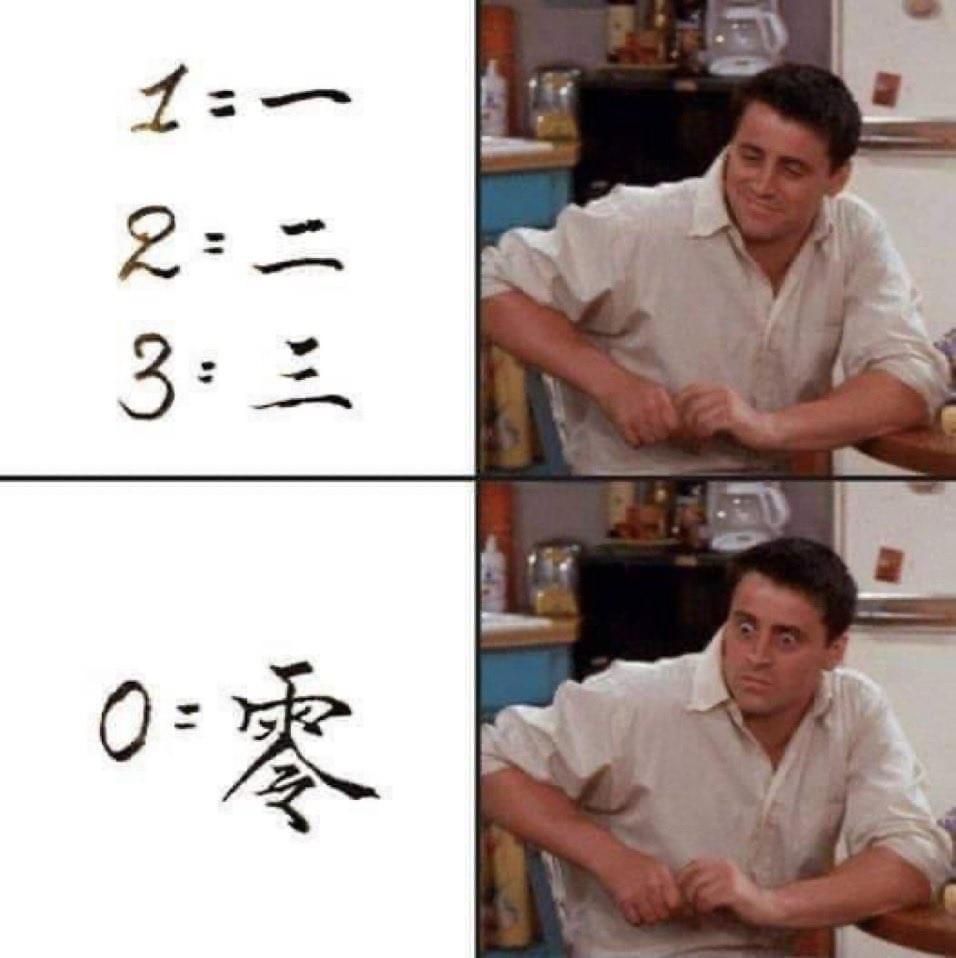this post was submitted on 29 Apr 2024
981 points (99.4% liked)
Memes
46747 readers
944 users here now
Rules:
- Be civil and nice.
- Try not to excessively repost, as a rule of thumb, wait at least 2 months to do it if you have to.
founded 5 years ago
MODERATORS
you are viewing a single comment's thread
view the rest of the comments
view the rest of the comments

I'm sure the chinese have equivalent memes about having to learn arabic numbers, at least you don't have to use it in written out numbers, 20 is 二十, two-ten, 200 is 二百, two-hundred, 2000 is 二千, two-thousand, 200,000 is 二十万, two-hundred-thousand.
There less memorizing irregular words like twelve and X-teen and converting 30 to thirty, since it's all pronounced as written.
It probably sounds silly but I quite enjoy not memorizing different names for days of the weeks and months like when I was learning french ... Lundi, Mardi ...
Nice to be like 星期一,星期二,星期三 ... for week days and 一月,二月,三月... for months.
Same, and not having to remember different versions of words for tense and gender is great. Where Chinese gets you back though, is measure words. Is a can of beans many 颗? 粒? One 包? Oh I was supposed to remember 罐?
I mean tbf you're addressing a can of bean, so 罐 is correct. It's the container that count, not the content.
That’s not what Mr Rogers taught me
Okay but what if that can of beans can suck its own dick?
I don't mind the measure words so much because you can always use the generic one and people will understand, it's the tones that really mess me up.
I like how in French it's almost the same as in English. Monday = Moon Day = Lunar Day = Lundi
Tuesday = Tyr's Day = Mars' Day (both being the god of war) = Mardi
This seems like it would be difficult for the visually impaired.
The separate counter for 10,000 does my head in
I lived in Korea for a while where they also do the ten thousand thing. I got used to it for numbers up to about ten million, but then would get quickly lost.
Since everybody was making a couple million won a month, knowing numbers that big was necessary.
Shhhh they don't need to know that yet.
Yeah, every time I see it i think "man"
Same, my brain can't comprehend the counting behind that
Japanese pronounces some numbers different depending on what you are counting. Is this the same for Chinese?
I think there are certain phrases found in different dialects of Chinese. In Cantonese, the formal way of reading twenty is 十二, but the colloquial term would be 廿.
Edit: Should be 二十
十二 not 二十?
Whoops! You got that right. Should be 二十
No, but whenever you have something that's countable (even if it's just 1), you have to do , so instead of "I have a ticket" or "we want 2 waters", you have to do "I have 1 ticket" or "I(plural) want 2 water".
There's a generic measure word, but I think it's seen as improper to use it.
Yea, Chinese people understand when you do that, but they first look at you with this confused look thinking 'he wants two chopstic pieces?' and then realize you have a vocabulary of a two-year-old.
Source:lived in China long enough to learn yo ask for things, but not long enough to learn the countable nouns.
A bit like confusing much and many or some and any, which I did a lot when I first learnt English.
the number 2 is said "liǎng" more commonly; it's like saying "a couple" but more strictly. "èr" is used for counting or maths
Afaik, no. Japanese either uses 音読み onyomi = Chinese reading (literally "sound reading", 音 = sound, 読み = reading) and 訓読み Kunyomi = Japanese reading (訓 has multiple kanji meanings. I learned it as "instruction". Sites list the meanings as 訓 = instruction, Japanese character reading, explanation, read) for words that have kanji (Chinese characters). The original Chinese characters don't have a "Japanese reading" afaik. They are Chinese after all.
Bro first of all, no one should ever freeze a gyro, second, will you please elaborate because that is 100% interesting
Basically certain words use a different counter, and it changes how you would say 1, 2, 3 etc. so there is a counter for big living things, small living things, flat things, round things, money etc. A lot of the numbers are similar with slight changes in pronunciation.
So instead of ichi for 1, it might be ippon, ittou, issoku etc. if you know it's a counter you can usually tell what the number is from the start of the word. Though there are exceptions like hitotsu, which is also one. Though if they use the "Chinese" characters you can know what it means when reading it without knowing how it's actually pronounced.